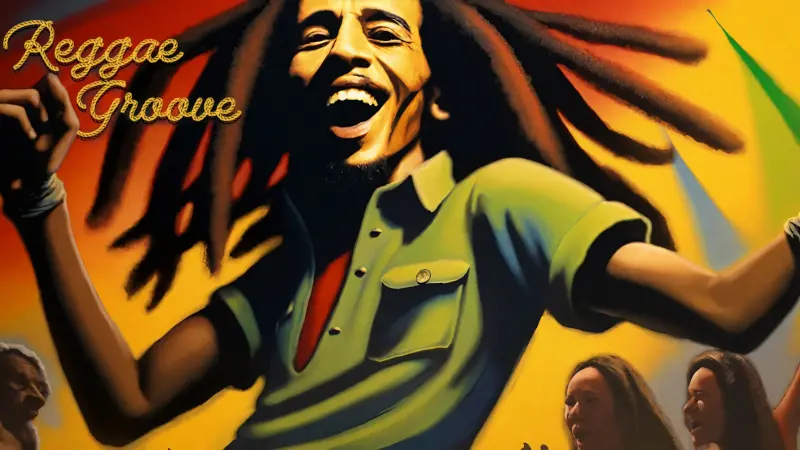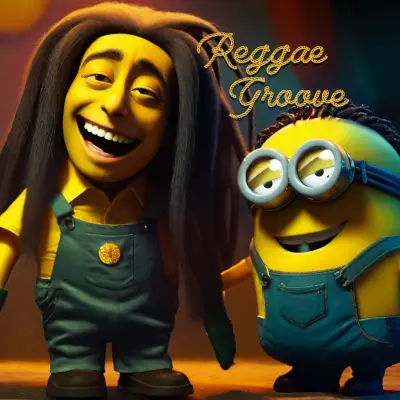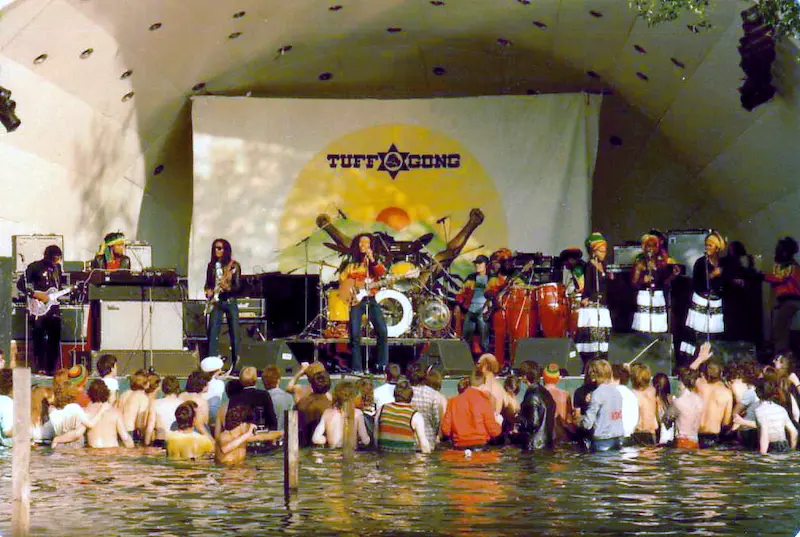
Summary: How Bob Marley’s Music Inspired the World
Bob Marley’s influence on music spans genres from rock and hip-hop to pop, primarily due to five revolutionary factors:
- Introducing the One-Drop Rhythm as a global sound.
- Using his lyrics as a blueprint for protest and social justice movements worldwide.
- Popularizing the Rastafarian message of spiritual and political liberation.
- Mastering the blend of confrontation and unity in a single song.
- Serving as the first non-Western music superstar, which demonstrated the commercial power of world music.
Continue reading for a deep dive into each factor…
Introduction – Bob Marley’s Music
Few artists have shaped both a musical style and a view on life. Reggae legend Bob Marley is one of that rare group. His music is more than just a collection of reggae songs; it stands for liberation, togetherness, and defiance.
Even those who have never been to Jamaica can hum “One Love” or remember lines from “Redemption Song.” They might not know every verse, but they get what Marley represented. His work has evolved into a global anthem for justice and peace, reaching well beyond Kingston’s streets.
This didn’t happen by coincidence. Marley’s life was a tale of resilience, marked by poverty, racial alienation, political turmoil, and spiritual awakening. Yet his voice broke through those barriers. By exploring his beginnings, musical innovations, reggae influence, and global activism, we can understand how Bob Marley’s music became a worldwide anthem for justice.
Roots and Identity: From Nine Mile to Trenchtown
Robert Nesta Marley was born on February 6, 1945, in the rural village of Nine Mile, Jamaica. His mother, Cedella Malcolm, was a Black Jamaican teenager, while his father, Norval Marley, was a white British naval officer in his sixties. This mixed heritage put young Bob at a cultural crossroads. Often teased for his mixed race, Marley felt both a sense of belonging and alienation.
Instead of weakening him, these challenges sharpened his view of the world. His music later echoed themes of equality, unity, and liberation that stemmed from these early struggles.
As a child, Marley immersed himself in the sounds of rural Jamaica—folk songs, gospel choirs, and the rhythms of ska and rocksteady. Everything changed when he moved with his mother to Kingston’s Trenchtown. This neighborhood, with its zinc shacks and unpaved streets, was also a center of creativity. Out of hardship, Marley found inspiration. The energy of Trenchtown shaped his music into something raw, authentic, and globally relatable.

The Wailers: Forging a New Sound
In 1963, Bob Marley, Peter Tosh, and Bunny Wailer formed The Wailers. At first, they played ska and rocksteady, upbeat genres that matched the optimism of newly independent Jamaica. But as the nation’s social and political climate changed, so did their music.
The Wailers slowed the tempo, highlighted the offbeat “skank” guitar stroke, and started writing lyrics about poverty, oppression, and resilience. Songs like “Simmer Down,” “Concrete Jungle,” and “Trenchtown Rock” weren’t just catchy—they voiced everyday struggles.
By the early 1970s, their partnership with Chris Blackwell of Island Records marked a key moment. Albums like Catch a Fire and Burnin’ were packaged for international audiences while keeping Jamaican authenticity. Eric Clapton’s cover of “I Shot the Sheriff” helped bring Marley into the global spotlight, introducing reggae to listeners unfamiliar with its rhythms.
Bob Marley’s Reggae Influence on Modern Music
Bob Marley didn’t invent reggae, but he defined its golden era and gave it worldwide recognition. His reggae influence spread far beyond the Caribbean, shaping genres from rock to hip-hop to EDM.
Some of Marley’s defining contributions include:
- The One Drop Rhythm – Reggae’s heartbeat, with the drum accent on the third beat. Though it existed before, Marley popularized it globally.
- Soulful Basslines – Aston “Family Man” Barrett’s basslines were not just background—they formed melodic foundations.
- Offbeat Guitar Skanks – That sharp, upstroke guitar style became instantly recognizable as reggae.
- Lyrics with Substance – Marley infused reggae with messages about revolution (“Get Up, Stand Up”), faith (“Exodus”), and reflection (“Redemption Song”).
- Global Musical Fusion – His music combined reggae with rock, blues, funk, and soul, broadening its reach.
Through Marley, reggae influenced rock artists like The Clash, soul singers like Stevie Wonder, and later hip-hop acts like Public Enemy and Nas. Today, traces of Marley’s reggae influence can be found in pop, EDM, and even surf culture.
Lyrical Themes: Protest, Peace, and Redemption
If rhythm was Marley’s engine, lyrics were his compass. He turned local struggles into global anthems without losing authenticity.

- Protest and Resistance – Songs like “Get Up, Stand Up” and “Burnin’ and Lootin’” demanded rights and expressed the anger of the oppressed. Students in California, workers in Manchester, and activists in South Africa all found meaning in his words.
- Unity and Healing – Alongside rebellion, Marley spoke of peace. “One Love” was written during Jamaica’s violent political struggles but became a call for togetherness.
- Spiritual Redemption – Through Rastafarianism, Marley framed his music as sacred. “Redemption Song,” stripped to just guitar and voice, remains one of the most profound calls for freedom in modern music.
This balance between confrontation and compassion explains why his songs appealed to both revolutionaries and moderates.
Rastafari: Spiritual Fire in Every Note
Marley’s dedication to Rastafarianism transformed his music from popular art into spiritual doctrine. Rastafari emphasized African pride, resistance against oppression, and devotion to Jah (God).
Marley became Rastafari’s most visible representative. His dreadlocks, ital diet, and faith in Haile Selassie shaped his identity. Through him, songs like “Exodus” and “Forever Loving Jah” carried Rastafarian values to audiences who might never have encountered them.
To many listeners, Marley was not just a musician but a prophet, teaching through rhythm.
Political Activism: The Peacemaker with a Guitar
Unlike many artists who avoid politics, Marley embraced it. He viewed reggae as both a cultural weapon and a unifying force.
In December 1976, just before Jamaica’s national election, Marley was shot in his home during an assassination attempt. Two days later, wounded and bandaged, he performed at the “Smile Jamaica” concert. His reasoning was straightforward: “The people who are trying to make this world worse aren’t taking a day off—how can I?”
At the One Love Peace Concert in 1978, Marley shocked the world when he brought political rivals Michael Manley and Edward Seaga on stage, joining their hands above his head. This became one of the most iconic images in Jamaican history.
Beyond Jamaica, Marley supported Pan-Africanism. His song “Zimbabwe” became the unofficial anthem of that nation’s liberation. When Zimbabwe celebrated independence in 1980, Marley performed before tens of thousands, showing music’s power to shape history.

Global Breakthrough: From Trenchtown to the World
By the mid-1970s, Marley was reggae’s global ambassador. His 1977 album Exodus was a pivotal moment—recorded in London after the shooting, it held both political urgency and uplifting hope. Hits like “Jamming,” “Three Little Birds,” and “One Love” crossed genres and borders. Time Magazine later named Exodus the “Album of the Century.”
Marley’s tours sold out stadiums across Europe, North America, South America, and Africa. His concerts were not just performances; they were spiritual and political events. Fans from Lagos to Berlin, Kingston to New York, all heard the same message: liberation, unity, and hope.
A Lasting Legacy: Why His Reggae Influence Still Resonates
Bob Marley died on May 11, 1981, in Miami, at the age of 36, from acral lentiginous melanoma, a rare form of skin cancer. His final words reportedly were: “Money can’t buy life.”
His funeral in Jamaica drew hundreds of thousands of mourners, including world leaders, musicians, and Rastafarian elders. He was laid to rest in Nine Mile, where his journey began.
Accolades and Recognition
- Over 75 million albums sold worldwide
- Grammy Lifetime Achievement Award (2001)
- Rock & Roll Hall of Fame induction (1994)
- Hollywood Walk of Fame star
- Jamaican Order of Merit
- United Nations Peace Medal of the Third World (1978)
- UNESCO recognition of reggae as Intangible Cultural Heritage (2018)
These awards only hint at his real accomplishment: transforming global culture.

Family Legacy
Marley’s message did not die with him—it multiplied.
- Ziggy Marley has won multiple Grammys and continues to blend reggae with social commentary.
- Stephen Marley mixed hip-hop and roots reggae as a producer and performer.
- Damian “Jr. Gong” Marley gained worldwide recognition with “Welcome to Jamrock.”
- Other children, including Ky-Mani and Julian, have also carried the Marley sound into new eras.
Together, they keep reggae relevant while respecting its roots.

Cultural Reach
Marley’s reggae influence goes beyond music. His image is a global symbol of resistance and hope. His songs appear in yoga playlists, political rallies, surf films, EDM remixes, and even ads. Critics point out that this commercialization sometimes softens his radical edge. Still, it shows how adaptable and enduring his message remains.
Frequently Asked Questions (FAQs) About Bob Marley’s Legacy
What was Bob Marley’s most famous song?
“One Love,” “No Woman, No Cry,” and “Redemption Song” are often cited as his most iconic tracks, each representing unity, resilience, and reflection.
When did Bob Marley die, and how?
He died on May 11, 1981, at age 36 from melanoma that had spread from his toe to vital organs.
Why is Bob Marley considered the face of reggae?
Although reggae was shaped by pioneers like Jimmy Cliff, Toots Hibbert, and Peter Tosh, Marley gave it global visibility and became its most lasting icon.
How did Bob Marley influence hip-hop and modern music?
His ideas of empowerment and resistance shaped hip-hop’s spirit, with artists from Nas to The Notorious B.I.G. citing him as inspiration. His reggae influence continues across genres from rock to EDM.

Conclusion: Bob Marley’s Enduring Reggae Influence
Many ask: What was Bob Marley’s influence on reggae? A better question is: What part of reggae wasn’t influenced by Bob Marley?
He turned rhythm into resistance, blended melody with movement, and showed that music could be both spiritual text and political tool. From Trenchtown’s shanties to world stadiums, his journey illustrates how genuine art can cross borders.
Bob Marley’s reggae influence remains a global anthem because the struggles he sang about persist—and so does the hope he offered. Decades after his death, his voice continues to comfort, provoke, and unite. He didn’t just change reggae. He transformed the way we perceive the world.


